古希腊与古罗马文明 英文
古希腊罗马简史(英文)
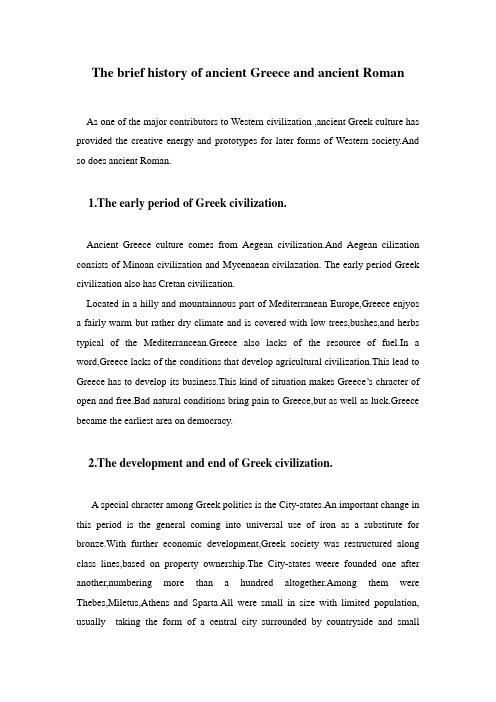
The brief history of ancient Greece and ancient RomanAs one of the major contributors to Western civilization ,ancient Greek culture has provided the creative energy and prototypes for later forms of Western society.And so does ancient Roman.1.The early period of Greek civilization.Ancient Greece culture comes from Aegean civilization.And Aegean cilization consists of Minoan civilization and Mycenaean civilazation. The early period Greek civilization also has Cretan civilization.Located in a hilly and mountainnous part of Mediterranean Europe,Greece enjyos a fairly warm but rather dry climate and is covered with low trees,bushes,and herbs typical of the Mediterrancean.Greece also lacks of the resource of fuel.In a word,Greece lacks of the conditions that develop agricultural civilization.This lead to Greece has to develop its business.This kind of situation makes Greece’s chracter of open and free.Bad natural conditions bring pain to Greece,but as well as luck.Greece became the earliest area on democracy.2.The development and end of Greek civilization.A special chracter among Greek politics is the City-states.An important change in this period is the general coming into universal use of iron as a substitute for bronze.With further economic development,Greek society was restructured along class lines,based on property ownership.The City-states weere founded one after another,numbering more than a hundred altogether.Among them were Thebes,Miletus,Athens and Sparta.All were small in size with limited population, usually taking the form of a central city surrounded by countryside and smalltowns.They were ruled either by Inoians or Dorians,with Athens and Sparta as the most develped and powerful.The newly founded polis was ususally ruled by either the slave-owning aristocrat or the military leader turned king.But some tates could be ruled by the archons such as Draco and Solon,who would proceed with their reforms.With the City-statas developing,old law can’t meet majority any more.So Greek politicians,for example,Draco,cleisthenes and Peisisitratus,begain to improve Greek polis.Their politics develop Greek democracy and make Greek people have more power.Greek civilization came to its peak during Pericles’reign and then beganto decling.Under the leadership of Pericles during 499-449 BC,the coalition force of the Greek city-states defeated the Perisian troops in the two wars against Perisian invaders.Howeve,peace and stability did not last long after the victory because a split occurred between the two strongest city-states leading to the decline of Athens and most poleis involved in the war which spead all over the Peninsula of Peloponnesus.The wars not only brought great losses to Athens,but also dooomed all the Greek poleis to irretrievable setback and decline,and opened the way for the invasion of later aggresors like Macedonia, Gaul and Rome.The regions of Greek peninsula and Agean Sea islands were all seized and conquered by welltraned Roman troops before 146 BC and merged into the map of Roman Empire.3.The beginning of RomeThe Italian city of Rome is the birthplace of Roman Empire and,therefore,the origin of Roman culture.Geographically located in the south of the European continent and surrouned on three sides by the seas,Italy occupies the Apennines Peninsula,one of the three major land masses of the northern MediterraneanEarly Rome originated from some small villages in central Italy,not fr away from the seashore.It is said that early Rome was ruled by seven kings.Afterwards,the citywas ruled by two consus and a senate.The historical process began about 509 BC or so and lasted until over 500 years later when the Emperor Octavian founded his dictatorship in place of the republic.4.The devolopment of RomeDuring the 4th century BC, Rome unified Italy by military conquest. There are many wars in Roman history.A large number of slaves were brought to Rome because of victories duing the frequent wars.These slavesdo a lot for Roman development.In 83 BC,the Roman military commander L.Sulia Felix,led his troops in putting down his opponents and established his dictatorship.By conquering Gaul,Caesar’s military power,financial income and his own prestige were all greatly enhanced,thus achieving outstanding merit in both civil and mili tary affairs.After Caesar died,it led to the birth of the second Triumvirate.IN the two centuries after Augustus took power,the Roman Empire reached its culmination.Beginning from the 5th century or so,the Roman Empire embarked on a path of decline.Civil wars repeatedly broke out and brought instability and disasters to the ordinary people.Economic development and social prosperity were checked.Long before that,the Roman Empire had actually broken up into two parts.。
The Greek Civilization (古希腊文明) PPT

大家学习辛苦了,还是要坚持
继续保持安静
Ancient Greek architecture
Ancient Greek architecture is best known from its temples, many of which are found throughout the region, mostly as ruins but many substantially intact.
Beijing
Shanghai
Zhejiang
Other architectural forms are the processional gateway, the public square surrounded by colonnade, the town council building, the public monument, the monumental tomb and the stadium.
Greek classical art
Venus de Milo
Laocoon and his sons
Discus Thrower
The arts of ancient Greece have exercised an enormous influence on the culture of many countries all over the world, particularly in the area of sculpture. In the West, the art of the Roman Empire was largely derived from Greek models. In the East, Alexander the Great’s conquests initiated several centuries of exchange between Greek, Central Asian and Indian cultures, resulting in Greco-Buddhist art. Well into the 19th century, the classical tradition derived from Greece dominated the art of the western world.
古希腊罗马英文名词解释
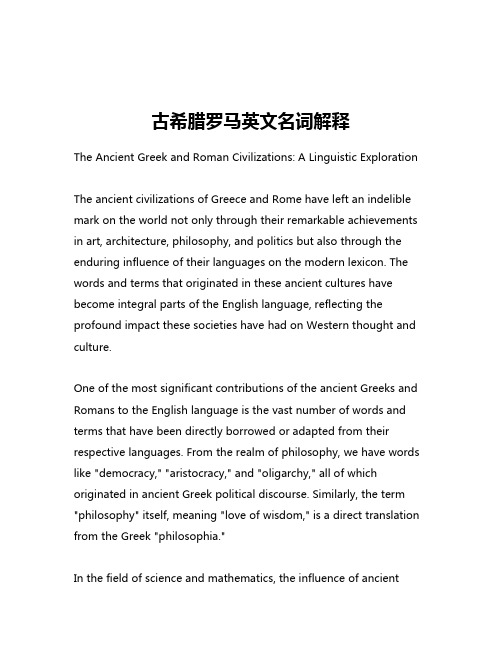
古希腊罗马英文名词解释The Ancient Greek and Roman Civilizations: A Linguistic ExplorationThe ancient civilizations of Greece and Rome have left an indelible mark on the world not only through their remarkable achievements in art, architecture, philosophy, and politics but also through the enduring influence of their languages on the modern lexicon. The words and terms that originated in these ancient cultures have become integral parts of the English language, reflecting the profound impact these societies have had on Western thought and culture.One of the most significant contributions of the ancient Greeks and Romans to the English language is the vast number of words and terms that have been directly borrowed or adapted from their respective languages. From the realm of philosophy, we have words like "democracy," "aristocracy," and "oligarchy," all of which originated in ancient Greek political discourse. Similarly, the term "philosophy" itself, meaning "love of wisdom," is a direct translation from the Greek "philosophia."In the field of science and mathematics, the influence of ancientGreek and Roman terminology is equally pervasive. Words like "atom," "molecule," and "biology" are all derived from Greek roots, reflecting the profound contributions of Greek thinkers to the advancement of scientific knowledge. Likewise, the Roman system of numerals, with its familiar symbols like "I," "V," and "X," continues to be used in various contexts, from clock faces to chapter headings.The realm of medicine has also been profoundly shaped by the linguistic legacy of ancient Greece and Rome. Terms like "anatomy," "physiology," and "psychiatry" all have their origins in the Greek language, while words like "virus," "vaccine," and "epidemic" are derived from Latin roots.The influence of ancient Greek and Roman culture is not limited to the realms of science and philosophy, however. The English language is also replete with words and phrases that reflect the artistic and literary achievements of these civilizations. From the term "tragedy," which originated in the dramatic performances of ancient Greece, to the concept of "heroic" deeds, which is rooted in the epic tales of Homer and Virgil, the linguistic legacy of these ancient cultures continues to resonate in the modern world.Furthermore, the legal and political systems of the modern world owe a significant debt to the ancient Romans, whose language and concepts have been woven into the fabric of many contemporarylegal and governmental structures. Words like "constitution," "senate," and "civil" all have their origins in the Latin language, reflecting the enduring influence of Roman law and governance.In addition to the direct borrowing of words and terms, the ancient Greeks and Romans have also left a lasting imprint on the English language through the use of prefixes, suffixes, and root words. Many of the building blocks of the English language can be traced back to these ancient languages, allowing for the creation of new words and concepts that continue to evolve and expand the linguistic landscape.The impact of ancient Greek and Roman civilizations on the English language is not limited to the specific words and terms that have been adopted or adapted. These ancient cultures have also profoundly shaped the way we think about and use language itself. The emphasis on rhetoric, logic, and the power of persuasive speech in ancient Greece, for example, has had a lasting influence on the way we approach communication and the construction of arguments.Moreover, the rich literary traditions of ancient Greece and Rome, from the epic poetry of Homer and Virgil to the philosophical dialogues of Plato and Cicero, have provided a wellspring of inspiration and influence for countless writers and thinkers throughout history. The enduring legacy of these ancient masterpieces can be seen in the way they have shaped thedevelopment of literary genres, narrative structures, and stylistic conventions that continue to be employed in contemporary literature and creative expression.In conclusion, the linguistic legacy of ancient Greece and Rome is a testament to the enduring power and influence of these remarkable civilizations. The words, terms, and concepts that have been woven into the fabric of the English language reflect the profound impact these ancient cultures have had on the development of Western thought, culture, and society. As we continue to grapple with the complexities of the modern world, the linguistic inheritance of ancient Greece and Rome remains a vital and indispensable part of our cultural and intellectual heritage.。
古希腊英文简介
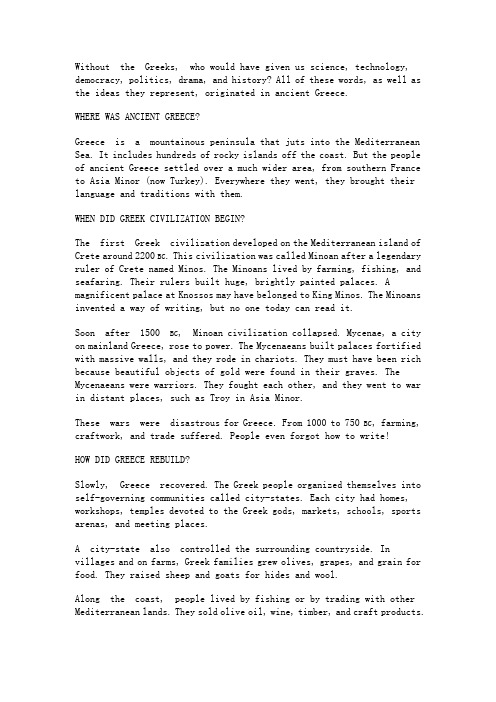
Without the Greeks, who would have given us science, technology, democracy, politics, drama, and history? All of these words, as well as the ideas they represent, originated in ancient Greece.WHERE WAS ANCIENT GREECE?Greece is a mountainous peninsula that juts into the Mediterranean Sea. It includes hundreds of rocky islands off the coast. But the people of ancient Greece settled over a much wider area, from southern France to Asia Minor (now Turkey). Everywhere they went, they brought their language and traditions with them.WHEN DID GREEK CIVILIZATION BEGIN?The first Greek civilization developed on the Mediterranean island of Crete around 2200 BC. This civilization was called Minoan after a legendary ruler of Crete named Minos. The Minoans lived by farming, fishing, and seafaring. Their rulers built huge, brightly painted palaces. A magnificent palace at Knossos may have belonged to King Minos. The Minoans invented a way of writing, but no one today can read it.Soon after 1500 BC, Minoan civilization collapsed. Mycenae, a city on mainland Greece, rose to power. The Mycenaeans built palaces fortified with massive walls, and they rode in chariots. They must have been rich because beautiful objects of gold were found in their graves. The Mycenaeans were warriors. They fought each other, and they went to war in distant places, such as Troy in Asia Minor.These wars were disastrous for Greece. From 1000 to 750 BC, farming, craftwork, and trade suffered. People even forgot how to write!HOW DID GREECE REBUILD?Slowly, Greece recovered. The Greek people organized themselves into self-governing communities called city-states. Each city had homes, workshops, temples devoted to the Greek gods, markets, schools, sports arenas, and meeting places.A city-state also controlled the surrounding countryside. In villages and on farms, Greek families grew olives, grapes, and grain for food. They raised sheep and goats for hides and wool.Along the coast, people lived by fishing or by trading with other Mediterranean lands. They sold olive oil, wine, timber, and craft products.The Greeks were especially known for their excellent metalwork and painted pottery.The Greeks liked debating, questioning, and exploring new ideas. They admired logical arguments and scientific proof. They believed in justice and human dignity. But they were not all equal. Some Greeks were born free. Others were slaves with no rights. Greek men had freedom to work, study, and travel. Women spent their lives at home. They wove cloth, bore children, and cared for their families.The Greeks also believed in gods who controlled human lives. They honored the gods and made offerings to them. In return, they hoped for blessings. To please the gods, city-states held religious festivals, with competitions in music, dance, drama, poetry, and sports. The Olympic Games began as a religious festival of this kind, probably in 776 BC.WHICH WAS THE STRONGEST CITY-STATE?By around 500 BC, two city-states were supreme. Sparta was famous for its fearsome fighting men. It had a powerful ruling council, secret police, and spies. All its citizens—including women and children—were trained to be tough and brave. Slaves grew food.Athens was a democracy. All adult male citizens had the right to elect leaders, serve on juries, and debate government plans. Athenians prized learning and the arts. They asked the best artists, architects, philosophers, and writers to live and work in their city. From 480 to 359 BC, Athens collected tribute(payments) from smaller, weaker Greek cities. It used this money, and wealth from its silver mines, to buy warships. It also rebuilt the center of the city in magnificent style, with temples, statues, law courts, theaters, and strong walls.From 490 to 479 BC, Athens and Sparta fought together against invaders from Persia. But then they became rivals. From 431 to 404 BC, they fought each other in a bitter war. The war severely weakened both powers.HOW DID GREEK POWER END?In 338 BC, Greece was conquered by Macedonia, a kingdom to the north. City-states lost their political power, but Greek civilization continued and spread to many distant lands. Under Macedonian rule, Greek philosophers, mathematicians, and scientists made discoveries that are still useful today.In 146 BC, Roman armies invaded Greece. Roman leaders admired Greek achievements, and so Greek ideas and artistic styles spread still further, through the lands of the Roman Empire. In AD 395, Greece became part of the Byzantine Empire. It was ruled from the city of Constantinople (now Istanbul, Turkey). Greek language, knowledge, and technology remained important until the Byzantine Empire fell to Ottoman Turks in 1453.THE INFLUENCE OF ANCIENT GREECEToday, Greek civilization still shapes the way people think, speak, study, govern, design buildings, and spend their leisure time. Many words in the English language come from Greek roots. Questions raised by Greek philosophers are still debated. Greek plays are read and performed. The Olympic Games are held every four years, just as in ancient Greece. Many of our buildings—especially those with tall, round columns—are modeled after Greek buildings. The influence of ancient Greece is felt throughout Europe and in all the lands that European nations once ruled.。
古希腊和古罗马文化(1) - 用于合并
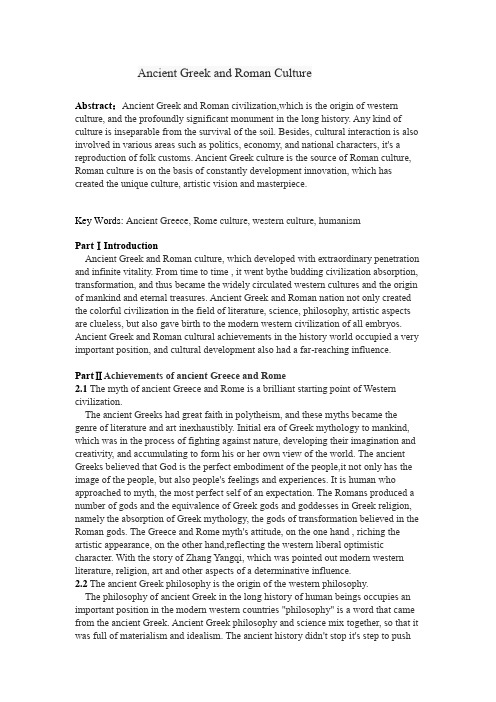
Ancient Greek and Roman CultureAbstract:Ancient Greek and Roman civilization,which is the origin of western culture, and the profoundly significant monument in the long history. Any kind of culture is inseparable from the survival of the soil. Besides, cultural interaction is also involved in various areas such as politics,economy, and national characters, it's areproduction of folk customs. Ancient Greek culture is the source of Roman culture, Roman culture is on the basis of constantly development innovation, which has created the unique culture, artistic vision and masterpiece.Key Words: Ancient Greece, Rome culture, western culture, humanismPartⅠIntroductionAncient Greek and Roman culture,which developed with extraordinary penetration and infinite vitality. From time to time , it went bythe budding civilization absorption, transformation, and thus became the widely circulated western cultures and the origin of mankind and eternal treasures. Ancient Greek and Roman nation not only created the colorful civilization in the field of literature, science, philosophy, artistic aspects are clueless, but also gave birth to the modern western civilization of all embryos. Ancient Greek and Roman cultural achievements in the history world occupied a very important position, and cultural development also had a far-reaching influence.PartⅡAchievements of ancient Greece and Rome2.1 The myth of ancient Greece and Rome is a brilliant starting point of Western civilization.The ancient Greeks had great faith in polytheism, and these myths became the genre of literature and art inexhaustibly. Initial era of Greek mythology to mankind, which was in the process of fighting against nature, developing their imagination and creativity, and accumulating to form his or her own view of the world. The ancient Greeks believed that God is the perfect embodiment of the people,it not only has the image of the people, but also people's feelings and experiences. It is human who approached to myth, the most perfect self of an expectation. The Romans produced a number of gods and the equivalence of Greek gods and goddesses in Greek religion, namely the absorption of Greek mythology, the gods of transformation believed in the Roman gods. The Greece and Rome myth's attitude, on the one hand , riching the artistic appearance, on the other hand,reflecting the western liberal optimistic character. With the story of Zhang Yangqi, which was pointed out modern western literature, religion, art and other aspects of a determinative influence.2.2 The ancient Greek philosophy is the origin of the western philosophy.The philosophy of ancient Greek in the long history of human beings occupies an important position in the modern western countries "philosophy" is a word that came from the ancient Greek. Ancient Greek philosophy and science mix together, so that it was full of materialism and idealism. The ancient history didn't stop it's step to pushaward. Ancient Greek philosophers and scientists are the center of the modern science and culture . At different fields of Greek philosophy, such as astronomy, mathematics, geometry, physics, geography, biology and other aspects have made great achievements.PartⅢReasons for the prosperity of ancient Greece and RomeSlavery is a political guarantee and a material prosperity of ancient Greek culture. Cultural and artistic prosperity need some certain social conditions, as we can see the large-scale labor slaves make Greek slavery flourished. Agriculture and handicraft industry development and prosperity of business provides a solid material foundation for the development of the culture. No slavery, no slave whose work hardly will not have a high development of culture in the ancient Greece. Democracy is the fundamental guarantee of academic freedom that is an important premise of the cultural prosperity. Greek religion plays a very important role in the Greek culture.Ancient Greek culture has not for the priests and monks who can control constraints.,As a result, they didn't become an obstacle to the development of culture. Greek religin freedom became even more open. Artists can give a full play to their imaginations and satisfy the desire of self-expression in the creation, and they will never to interfere with their affairs and persecute of priests or temples.Part ⅣConclusionThe essence of Western classical culture -- Humanism is a core factor in ancient Greek culture. Ancient Greek culture and humanistic spirit consist of the essence of Western classical culture. Ancient Greek humanism is based on individualism, and the people are rational, emotional, most of them are owning the will of the individualism. To pay attention to realize the individual value and focus on the frontage of the nature, and subjective initiative in front of society. Advocating people's wisdom is the essence of ancient Greek culture. The culture of ancient Greece and Rome is not only the cradle of Western civilization, but also for the western literature. It provides inspiration and vitality of development of art. We should learn step by step in the penetration of the bone marrow, thus, we can reflect and comprehend their own culture and find the essence of them. And we can have a good command to promote our national cultural awareness to enrich our own minds.Bibliography1.程仁桃,论中西文明源头的人文主义思想,河北大学,哲学社会科学版,2004。
古希腊文明【英文】 Ancient Greece
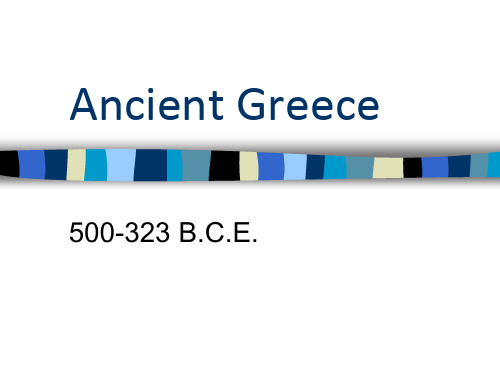
Greek Military
This is a phalanx. Soldiers get in a tight box. They each have a large shield and a 9 foot long spear.
Flamethrower!!!!!
Greek religion was polytheistic.
Ancient Greece
500-323 B.C.E.
Questions for Today
How does family form change with change from hunting gathering society to more permanent settlements? What was the basis for citizenship in Athens Greece? What are some characteristics of medieval towns? How did trade help to spread the plague? What is a ‘demographic transition’?
Geography
Greece is a peninsula about the size of Louisiana in the Mediterranean Sea. It’s very close to Egypt, the Persian empire (includes Turkey) and Rome.
Greek Invention
The Greeks invented the crane.
Greek Architecture
西方文化入门:罗马文化(英文)
Greatness to Romans, Glory to Greeks.
Common points Between Greeks and Romans
1. Political system 2. Latin and Greek: Indo-European language
Part Two: Roman History
Founding of Rome Three eras of Rome The declining of Roman Empire
Founding of Rome
1. Aeneas
The hero in Virgil’s epic: Aeneid The founder of Roman culture in Italy
European prose 4. He used language with economy and
ferocity
Marcus Tullius Cicero 西塞罗
(106—43 B.C.)
The Good of the people is the chief law.
Key words about Cicero
3) It was built in 27 B.C. and reconstructed in the 2nd century A.D.
4) It was a round, domed form and has the world’s first vast interior space
ⅱ Pont du Gard 沟渠
and it gradually lost control of territory; In 395 the Empire was divided into East (the
Greek Civilization And History(希腊文明和历史)
•
T h e B y z a n tin e P e rio d
• The Byzantine Period of Greek History is one of the least understood and the most important. The Byzantine Empire laid the foundations for Orthodox Christianity in Greece, the Balkans and Russia. The Fall of Constantinople meant the end of Christianity in the Middle East, the rise of Ottoman-Muslim power and the East-West friction that exists today. Byzantine Scholars brought with them from Constantinople the knowledge and art that would play a pivotal role in bringing about the Renaissance in Western Europe. In 51 AD Christianity had been introduced when Saint Paul preached in Athens on Mars Hill as well as in Thessaloniki and Corinth. On the island of Patmos The Book of Revelation, otherwise known as The Apocalypse was written by St. John the Theologian between 95 and 97 A.D. He had been exiled to the island by the Roman emperor Titus Flavius Domitianus for 18 months.
古罗马文化英语作文
古罗马文化英语作文Ancient Roman Culture。
Ancient Roman culture is one of the most influential and fascinating cultures in history. The Romans were renowned for their impressive architecture, engineering, literature, art, and military prowess. This essay will explore some of the most significant aspects of ancient Roman culture.Architecture。
Roman architecture was characterized by its grandeur and innovation. The Romans were famous for their engineering feats, such as the construction of aqueducts, roads, and bridges. They also built impressive public buildings, such as temples, amphitheaters, and baths. The Colosseum, which is one of the most iconic examples of Roman architecture, was used for gladiatorial contests and other public spectacles.Literature。
Ancient Roman literature was diverse and influential. The most famous Roman writers were Virgil, Ovid, and Cicero. Virgil's epic poem, the Aeneid, tells the story of the Trojan hero Aeneas and his journey to Italy, where he becomes the ancestor of the Roman people. Ovid's Metamorphoses is a collection of myths and legends that explores themes such as love, transformation, and the power of the gods. Cicero was a statesman and orator who wrote influential speeches and philosophical treatises.Art。
1.3.3 西方文明之源
杠 杆 定 律 的 应 用
古希腊——自然科学
定义:浸入静止流体(气体或
液体)中的物体受到一个浮力, 其大小等于该物体所排开的流 体重量,方向垂直向上并通过 所排开流体的形心。
螺旋提水器
浮力定律
仔细观察左图,思考: 1、图中的人在做什么? 2、怎样提水?
运用螺旋和 斜面原理
古希腊——自然科学
亚里士多德:创立了物 理学、植物学、动物学 和逻辑学等学科体系。
欧洲建筑艺术的典范
“我们都是希腊人。我 们的法律,我们的文学, 我们的宗教,我们的艺术, 都根源于希腊。”
——【英】雪莱
雪莱(1792—1822)
根据表格,请你为雪莱的话寻找依据。
猜猜下幅画上有哪些人,他们在做什么?有哪些著名哲学家?
亚
苏
里
格
柏士
拉
拉多
底
图德
毕 达 哥 拉 斯
欧
第
几
欧
里
根
得
尼 《雅典学院》作者:拉斐尔(意大利)
塞哥维亚(西班牙塞哥维亚省府)的古罗马高架水道桥, 建于公元50年前后(图拉真大帝统治时期),是迄今保存最完 整的古罗马帝国古迹之一。
建筑 类型
宗教建筑 如神庙、祭坛等; 公共建筑 如广场、剧场、斗兽场、浴场等; 纪念性建筑 如记功柱、凯旋门等; 道路工程建筑 如桥梁、道路、排水和供水系统; 生活建筑 公寓、别墅、私宅等。
“ The glory is Greece! The grandness is Rome!”
—古希腊、古罗马文明
西方文明之源
“没有希腊和罗马奠定的基础, 就不可能有现代的欧洲。”
——【德】恩格斯《反杜林论》
恩格斯(1820—1895)
- 1、下载文档前请自行甄别文档内容的完整性,平台不提供额外的编辑、内容补充、找答案等附加服务。
- 2、"仅部分预览"的文档,不可在线预览部分如存在完整性等问题,可反馈申请退款(可完整预览的文档不适用该条件!)。
- 3、如文档侵犯您的权益,请联系客服反馈,我们会尽快为您处理(人工客服工作时间:9:00-18:30)。
Roman Architecture: Building Materials
Brick
Romans perfected the art of brick-making
Concrete
Perfected this material Became the most characteristic material in Roman structures Was used to construct massive walls and great vaults
Ancient Greek and Roman Architecture
Architectural History ACT 322 Doris Kemp
Topics
Prehistory: The Etruscans Roman Characteristics Building Materials Architectural Ideals Structural Revolution Structures Civic Architecture Tombs
Roman Architecture: Architectural Ideals
Space
To the Romans, the space inside a structure was just as important as the exterior Interior space was the primary focus of Roman architecture and was shaped by vaults, arches, and walls
Roman architecture emerged from Hellenistic and Etruscan influences It held many original aspects, however
Materials and building techniques Fulfilled practical purposes
Roman Architecture: Prehistory: The Etruscans
Etruscan civilization
Preceded the Roman Empire in Italy Most of their architecture was destroyed by the Romans
Romans were fond of extravagance
Architecture for the powerful was gaudy and colorful, not like the ruins as seen today
Roman Architecture: Structural Revolution
Romans absorbed the Greek culture
Literature, philosophy, science, and painting New appreciation of the arts
Roman Architecture: Roman Characteristics
Only hidden structures, such as tombs, were spared
Much of their architecture was greatly influenced by the Greeks The legacy of Etruscan architecture lives on through its influence in Roman architecture
Served commerce, industry, and shipping
Байду номын сангаас
Ports Roads Aqueducts
Roman Architecture: Building Materials
Building materials were very important to the success of Roman architecture
Roman Architecture: Structural Revolution
Access to a wide variety of building stone including:
Volcanic tufa Limestone Travertine
Nearly unlimited quantities of white marble
Quarry opened by Augustus north of Pisa Other varieties were imported from the Far East
Roman Architecture: Roman Characteristics
April 21, 753 B.C.
Pinpointed by the Romans as the day Rome was founded Lacking in artistic culture
Early Romans were militant and very disciplined
Egyptians and Mesopotamians had used primitive arch forms Greeks had experimented with the arch and concrete with little success Etruscans had constructed vault-like forms
The combination of arches, vaults, and concrete in architecture are a pure Roman creation
The individual elements had been used in earlier civilizations
